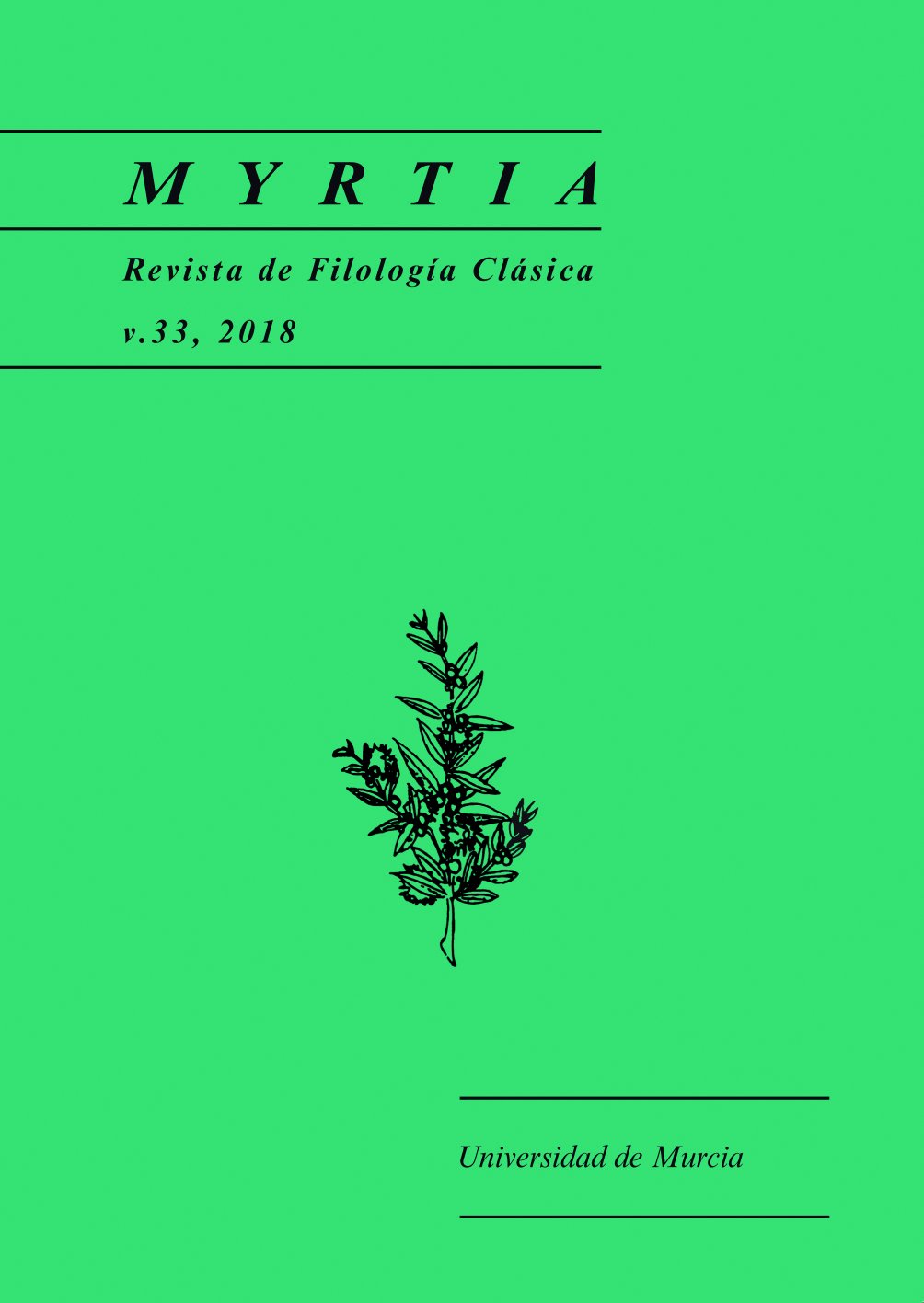The Social Impact of the Peloponnesian War through the Aristophanic Comedies
Abstract
Aristophanes writes the main part of his comedies at the same time as Peloponnesian War’s development (431-404 B.C.), so desires and concerns of his contemporary society are reflected in all his plays. Thus, with the analysis of the antithesis war / peace and its configuration through the aristophanic periods, we intend to demonstrate the gradual collapse of the hegemonic power of Athens, an Empire that loses its supremacy until the fall in the deepest demoralization after its capitulation against Sparta (404 B.C.).
Downloads
-
Abstract873
-
PDF (Español (España))1494
References
B. DE ARAS, 1952, “La Paz de Aristófanes”, Helmantica 3, pp. 33-52.
M. CROISET, 1973, Aristophanes and the Political Parties at Athens, New York.
N. DUNBAR, 1995, Aristophanes. Birds, Oxford.
L. EDMUNDS, 1980, “Aristophanes’ Acharnians”, YClS 26, pp. 1-41.
Ma. J. GARCÍA SOLER, 2003, “Un uso metafórico del vino en Aristófanes: las vinosas treguas de Acarnienses, 186-200”, Veleia 20, pp. 383-390.
W. D. FURLEY, 1996, Andokides and the Herms. Study of Crisis in Fifth-Century Athenian Religion, London.
L. GIL, 1996, Aristófanes, Madrid.
A. GRILLI, 2017, Aristofane. Gli Uccelli, Milano (=2006).
J. HENDERSON, 1987, Aristophanes. Lysistrata, Oxford.
R. KASSEL — C. AUSTIN, 1983, Poetae Comici Graeci (vol. 4), Berlin-New York.
J. S. LASSO DE LA VEGA (1972), “Realidad, idealidad y política en la comedia de Aristófanes”, CFC(g) 4, pp. 9-90.
D. M. MACDOWELL, 1995, Aristophanes and Athens: and Introduction to the Plays, Oxford.
G. MASTROMARCO, 1997, “La Lisistrata di Aristofane: emancipazione femminile, società fallocratica e utopia comica” en Sociedad, políticaliteratura. Comedia griega antigua, A. López Eire (ed.), Salamanca, pp. 103-116.
J. L. DE MIGUEL JOVER, 1997, “Lisístrata o la República del οἶκος” en Sociedad, política y literatura. Comedia griega antigua, A. López Eire (ed.),
Salamanca, pp. 295-306.
C. MOSSÉ, 2005, Périclès. L’inventeur de la démocratie, Paris.
H. J. NEWIGER, 1980, “War and Peace in the Comedy of Aristophanes”, YClS 26, pp. 219-237.
S. D. OLSON, 2007a, Aristophanes. Peace, Oxford (=1998).
S. D., OLSON, 2007b, Aristophanes. Acharnians, Oxford (=2002).
V. M. RAMÓN PALERM, 2011, “La comedia griega antigua: Aristófanes”, en Grecia y Roma a escena. El teatro grecolatino: Actualización y perspectivas,
A. Vicente Sánchez — J. A. Beltrán Cebollada (eds.), Madrid, pp. 97-129.
A. H. SOMMERSTEIN, 2001, The Comedies of Aristophanes. Wealth, Warminster.
M. C. TORCHIO, 2001, Aristofane. Pluto, Alessandria.
M. VICKERS, 1989, “Alcibiades on Stage: Aristophanes’ Birds”, Historia 38, pp. 267-299.
M. L. WEST, 1980, Delectus ex iambis et elegis Graecis, Oxford.
H. D. WESTLAKE, 1980, “The Lysistrata and the War”, Phoenix 34, pp. 38-54.
Las obras que se publican en esta revista están sujetas a los siguientes términos:
1. El Servicio de Publicaciones de la Universidad de Murcia (la editorial) conserva los derechos patrimoniales (copyright) de las obras publicadas, y favorece y permite la reutilización de las mismas bajo la licencia de uso indicada en el punto 2.
2. Las obras se publican en la edición electrónica de la revista bajo una licencia Creative Commons Reconocimiento-NoComercial-SinObraDerivada 3.0 España (texto legal). Se pueden copiar, usar, difundir, transmitir y exponer públicamente, siempre que: i) se cite la autoría y la fuente original de su publicación (revista, editorial y URL de la obra); ii) no se usen para fines comerciales; iii) se mencione la existencia y especificaciones de esta licencia de uso.
3. Condiciones de auto-archivo. Se permite y se anima a los autores a difundir electrónicamente las versiones pre-print (versión antes de ser evaluada) y/o post-print (versión evaluada y aceptada para su publicación) de sus obras antes de su publicación, ya que favorece su circulación y difusión más temprana y con ello un posible aumento en su citación y alcance entre la comunidad académica. Color RoMEO: verde.






